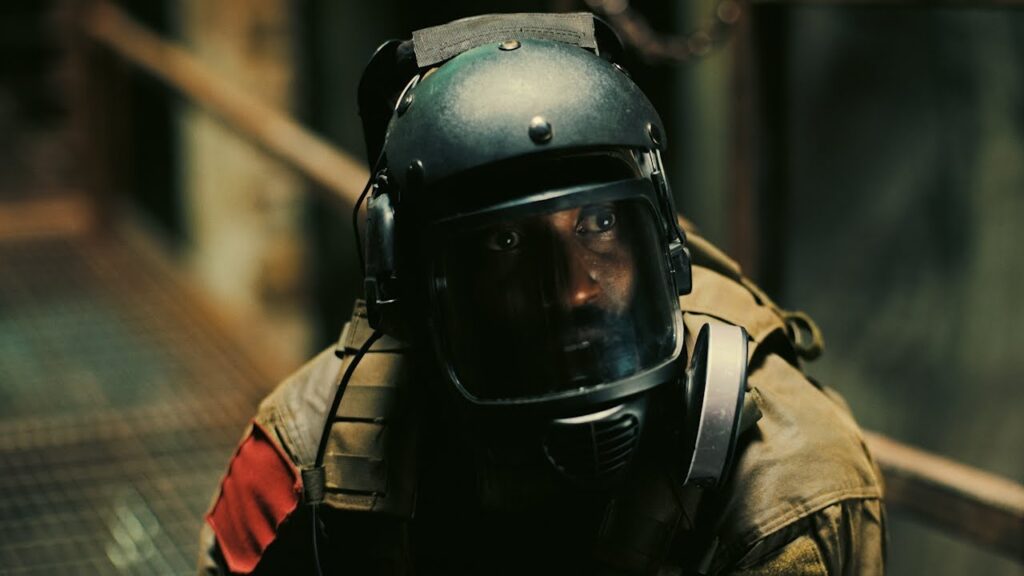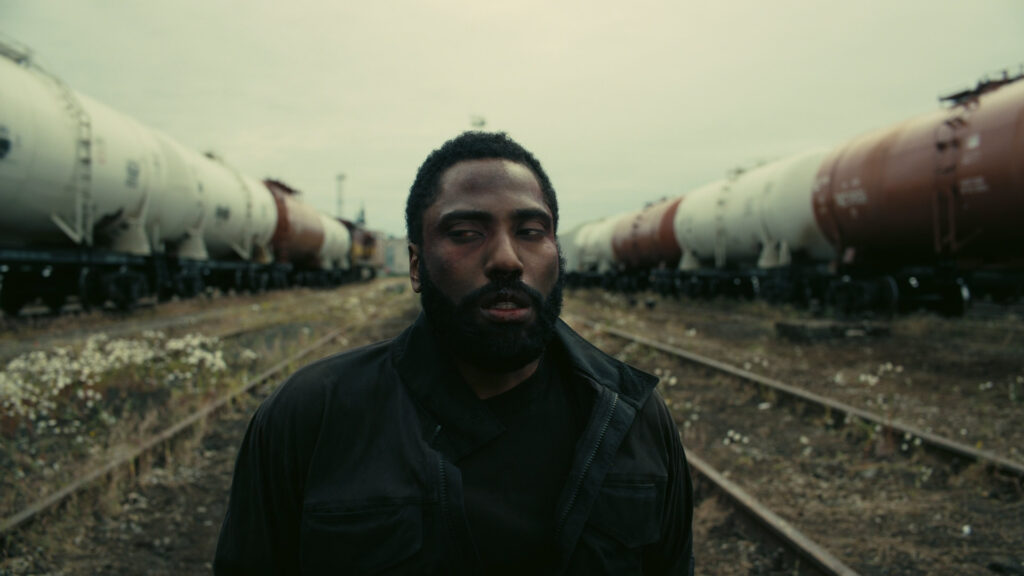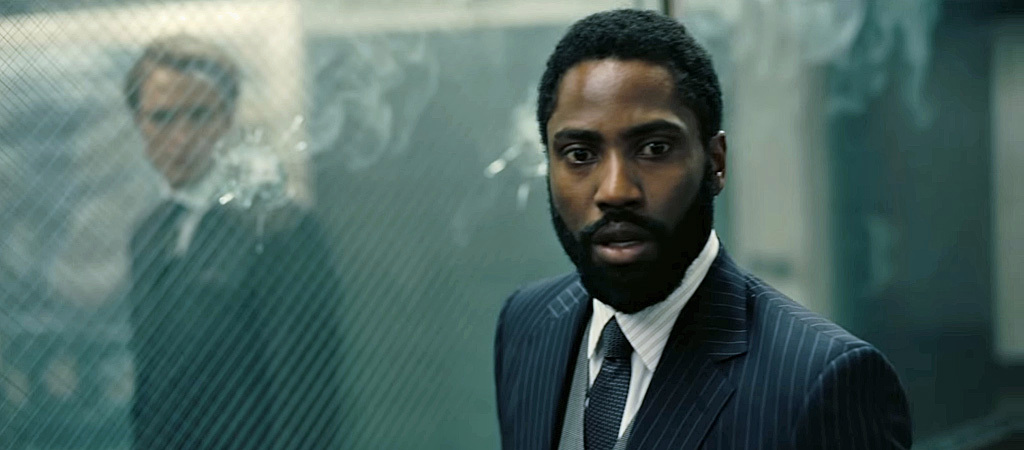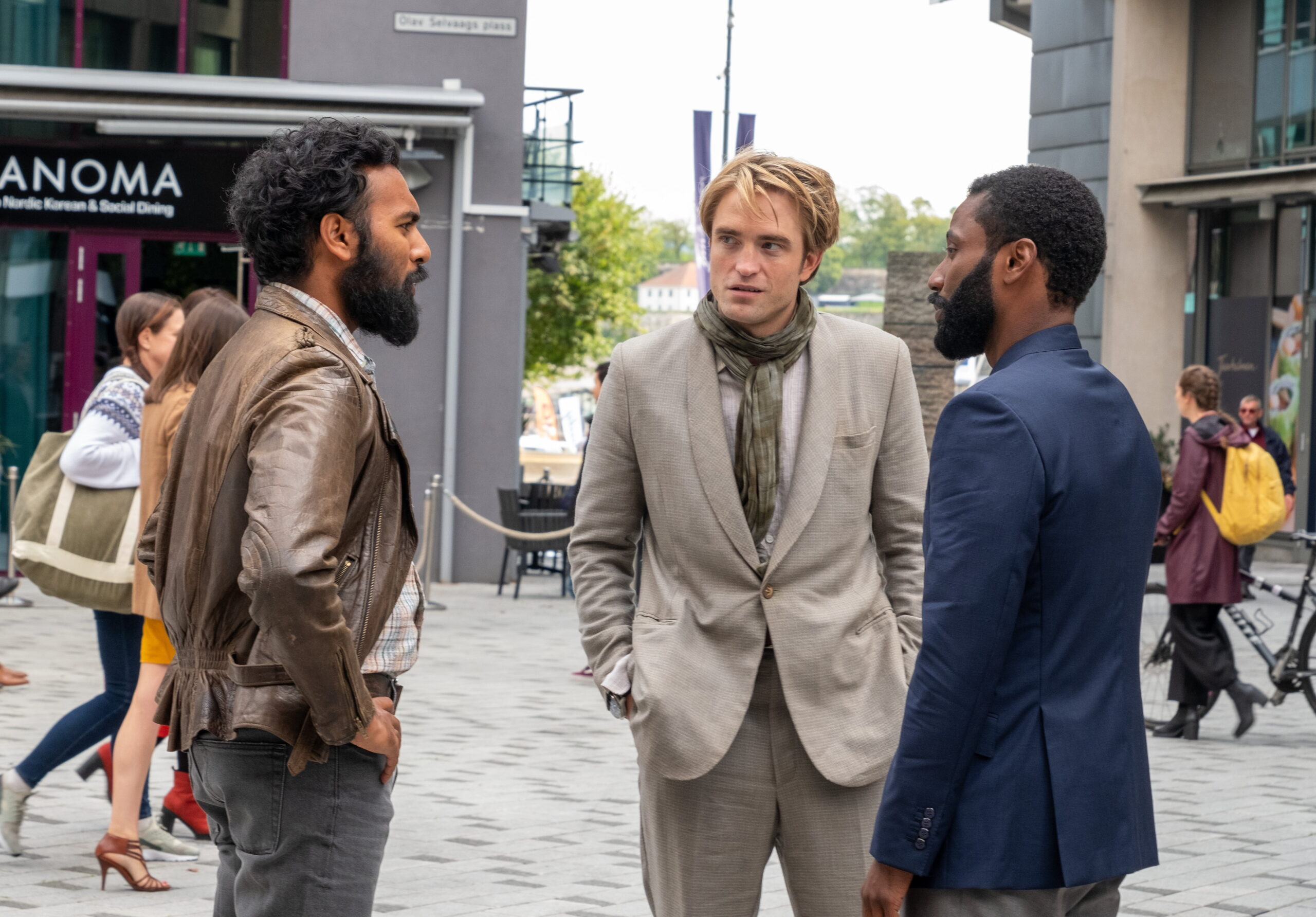People keep asking me: why THIS movie with nonstop exposition, ciphers for characters, inaudibly abrasive sound mixing, a frustrating plot……and my answer remains the same: I stopped trying to understand Tenet and just felt it. I stopped caring and took it for what it is. I stopped hoping for this to be Inception Part 2, and embraced it for the spy-movie-with-time-agents it is. I’d even argue Tenet feels more like dream logic than Inception.
Dreamlike Qualities

A folding street is certainly surreal, but have you seen an unexploding/exploding building?
A van somersaulting or falling backwards from a bridge in slo-mo is very dreamlike, but have you seen an Audi Q7 drive backwards forward with such precision?
Joseph Gordon-Levitt fighting a projection in zero-gravity is trippy, but have you seen John David Washington fight an inverted version of himself who, in one scene, crawls over his shoulder like a spider?
Sound Mixing and Overall Experience
Even the sound mixing which many seem to have a problem with; I think it fits into this off-kilter experience meant to overwhelm you. These all feel like the lucid reactions of a person who is aware that they are the protagonist in their own dream, trying to stay in character but also feeling outside of it all.
Video Game Analogy

I am the last person on earth to tell you how to watch a movie, but if you’re viewing Tenet expecting rationality or even logic, you’re kinda doing it wrong. I realize that sounds pretentious, so I’ll try and put it in other words. Tenet operates in a similar way to video games: The Protagonist (Washington), side characters, globetrotting, rules, plot mechanics, aesthetics, and “missions” (especially the climax) all feel like something Hideo Kojima would have made.
Rewatchability and Fixed Nature
The title card appears only when Washington swallows what he believes to be cyanide – the “Tenet” almost reading like a “Mission Failed” text.
The gamer in me was pleasantly thrilled. It is certainly the closest I’ll get to a Metal Gear Solid movie. Priya (Dimple Kapadia) and Ives (Aaron Taylor-Johnson) keep reminding the Pro to stop thinking of things linearly, so too must the audience stop trying to weigh this film against conventions like emotional resonance or narrative coherence!
Internal Logic and Metafilm Commentary
The TENET hand gesture symbolizes a handshake between you and yourself (foreshadowing The Protagonist fighting himself) The gesture represents the two flows of time interlocking like light and darkness butting against each other for eternity. Like the hand gesture, the film acts as a singular work, locked into its own internal logic.
It’s a palindrome with a precise, unalterable structure that feels initially impenetrable, but yields many rewards once you indulge it. Chris Nolan’s movies have a meta-layer about filmmaking. Tenet is specifically about rewatchability and the fixed nature of movies. Whenever you play the movie, you are viewing a fixed reality of the film world – it is 150 minutes locked in! You can scrub forwards and backwards through an unchangeable timeline.
The first time you watch it, you are The Protagonist – a confused rookie being thrown and tossed around with no idea what’s happening or why. The second time you watch it, you are Neil (Robert Pattinson) – you are in on the temporal pincer, coming in with a fresher understanding of what’s happening with the time mechanics. You guide your first-time self through the story, just like Neil does.
You help your past self understand the film, making it one of the most rewatchable movies ever! By coming back to this film again, it’s like I’m time travelling as an audience. Neil says “I’ll see you at the beginning, friend”, so we the viewers will see his character alive at the beginning when we rewatch it. “What’s happened’s happened” just like any film whose set of events have already played out and can’t be changed. But you will gain deeper meaning the more you “time travel” by rewatching Tenet.
Nolan’s Filmmaking Evolution
Before Dunkirk, Nolan’s films were constructed puzzles whose pieces fall into place by the end and served to the audience. This is how he became a household name, and would explain why his recent films have polarized many. Lately he’s gotten in touch with his inner-Lynchian side! I love how Dunkirk and Tenet make me feel “small” in an overwhelming Lovecraftian manner!
A Paradoxical Experience
Tenet is a paradox: you’re not meant to have it solved for you like Memento or The Prestige. This is Nolan at his most mechanical and simultaneously at his most loosely conscious. There’s a lot of newness here: a different main character, different composer, a different editor……its Nolan doing his Nolanisms, but then again, it’s nothing like a Nolan movie. He’s not under any pressure to tell another White widower who is psychologically damaged or afflicted by some condition or trauma. The Protagonist and Neil actually smile a lot while saving the world from bombs that didn’t go off; the latter looks particularly smashing in a scarf.
Witty Dialogue and Subtle Humor
Characters make witty remarks about their “hot sauce”, or how going back to inverted time is some “cowboy shit“. This director often accused of being clinical and self serious is having fun at his own expense. He lets his actors roll their eyes when being fed with head-cracking physics explanations. It took me more viewings to recognize this as a conscious effort, rather than some unintentional blunder.
Refreshing Practical Effects
In our CGI/greenscreen dispensation, it’s so refreshing to watch a large-scale globetrotting movie have all these scenes with ACTUAL windmills, speedboats, yachts and ships. I love how this spy movie opens with a sequence that subtly draws attention to its own artifice: the opera house audience being seated as the orchestra warms up, ready to watch a real show.
The Protagonist’s Physicality
When The Protagonist is about to breach the opera door with the SWAT team, the camera pushes into his face – everyone else has exhaled vapour all over their gasmasks from sprinting, but the Protagonist’s has less vapour which means he’s a better at saving his breath while running……and wow I love how Washington runs in this movie! Whether he’s fighting in that kitchen scene for instance, or how he runs with his arms flapping around, Washington’s physicality really gives him character! He may be the shortest guy in the room, but he will invert your expectations in a fistfight!
Themes of Destiny and Free Will
Tenet is, among other things, about coming into your own destiny. The Protagonist is following a threaded fate predetermined and created by HIMSELF. At the end of the film, The Pro goes on to set into motion every moment we see in the movie to ensure they save the world in the same way again and again. He is both puppet and puppeteer. It is revealed he is the founder of the Tenet organization – a word that implies holding on to a belief as an absolute truth.
The Protagonist as a Modern Savior

When you think about it, is Jesus or any other savior in mythology known for their backstory or emotional depth? NO, they are known for their miracles and trials. Neo-noir and spy movies tend to have cynical main characters, which is at odds with someone willing to give up their lives for their fellow human being. Washington has this generosity of spirit to him not usually seen in the genre (he saves the bad guy from drowning at one point)! We see more of the Pro’s “path of least resistance” approach when he comes up with the 4-truck heist in Tallinn. I love how this was such a simple smart and effective heist, no high body count, almost like a pacifist route!
Sator’s Complexity and Characterization

Sator (Kenneth Branagh) is more interesting here than people give him credit for. His Napoleon complex is in the vein of Joe Pesci in a Scorsese mafia epic. You don’t know what Sator is gonna do but you know he’s gonna snap at any point – just like how you don’t know which direction time is usually going in this film until something inverted happens. I still don’t understand that red room/blue room interrogation scene, but I feel that this antagonist is using a time machine to manipulate the situation to suit his odds.
Sator believing he could control the future and change it like a god, in contrast to Neil believing the past and future were what they were, unchangeable, is what ultimately dooms Sator! There is a domestic abuse angle with Sator and Kat (Elizabeth Debicki) that had this weird tension to it. When Sator takes his cufflinks onto his belt and menacingly approaches Kat in the yacht, it’s like I wasn’t watching a spy movie anymore! Sator attacks Kat at the Freeport and feigns stepping on her face.
Kat as the Emotional Core

The subtlety of Sator stopping himself is actually ten times more frightening than if he did – he’s letting her know that he owns her and she can’t escape from under his foot! Sator’s insane, ridiculous “You don’t negotiate with a tiger! You admire the tiger until he turns on you and you feel its true f****ng nature” monologue is just pure Bond villainy.
Kat becomes the tiger that turns on Sator and reveals her true nature (Her name is literally Kat!) It is not lost on me how Elizabeth Debecki radiates some strong Princess Diana aura. She even barely escapes dying in a car crash (she was in the backseat) because The Protagonist was there for her. This would then make Sator her overbearing Charles who owns a yacht. Kat making her liberating dive really harkens to that iconic picture of Lady Di in bikini on a yacht.
Kat as the Protagonist’s Counterpart
Indeed, Kat is definitely the emotional heart of the movie. She is kind of an acknowledgment of how the filmmaker rarely lets his women shine as individuals. When she sees her future self make that swan dive earlier on, it’s the movie saying she always had the power to take back her agency from her abusive partner. She was always her own Protagonist.
The Unattainable Connections in Tenet
In the twilight world of Tenet, the policy of agents is to suppress. Relationships cannot happen in the reality of a top-secret mission. A bromance blooms in the shadows, glimpses of a deeper emotional connection flicker by, but by the time it’s realized, it’s ultimately too late and always will be.
A “Smart Dumb” Genre Movie
A platonic relationship between a spy who can’t help but exude warm humanity and a woman trapped in an abusive marriage develops. Glimpses of their humor and chemistry peek through, but ultimately can’t be pursued. The reality of this film is: You can’t know each other; people pass each other by, focused on their jobs first, before each other. When people complain about lack of character and relatability in Tenet, I don’t blame them. But IT IS there.
Temporal Pincer Operations
I think about the head-cracking battle of Stalsk-12 at least thrice a week. This is just one Temporal Pincer operation out of many, within a larger Temporal Pincer operation covering the whole movie. The opera siege at the start is also a Temporal Pincer (one half of Sator’s private Russians holds hostages to lure out the fake SWAT team who will then eliminate the well-dressed informant and take the algorithm piece while covering their tracks with explosives). Imagine World War 3 but it’s just nations fighting by moving forward and backward through time simultaneously!
Christopher Nolan’s Unique Vision
Christopher Nolan might be the only person to depict a Chicken/Egg war, where one team moving forward receives information that they created in the future before they even know it. Tenet is a thought experiment about what a closed loop would look like in modern warfare. Maybe Nolan didn’t tell it in the best way ever, because humans on average are too linear to think along the lines of paradoxes. But I’m glad he did it anyway!
Free Will and Responsibility
In Nolan’s brutalist effect-before-cause world, he still believes that our actions make a difference. We have a responsibility with our free will to try to do good because if we don’t, the world will be overcome by encroaching darkness. The entropy of time going forwards and backwards is a metaphor for this: light vs darkness. Forward entropy (light), reverse entropy (darkness).
As Neil explains in the Rotas container, the flow of forward entropy (light) pushes against reverse entropy (darkness), and that’s why reality continues to exist. Otherwise, end of play! The FREE WILL of human beings to DO GOOD is what keeps the world moving. Time in this film is a block with no beginning, no end, all of it exists at once in a single moment, expanding in and out and upon itself, with seemingly no free will and where nothing can change. Yet people MUST STILL ACT to do good.
Ludwig Göransson’s Score
Ludwig Göransson’s score works because I’m not always aware of what exact instruments and everyday sounds he is pulling from. There could be a percussion, but it’s not quite a drum or an 808 or a hi-hat. You’re not always sure about the direction of the music, just like how you’re not always sure of the flow of time in the narrative.
Göransson’s Turnstile track includes every significant character’s theme when The Pro and Neil wheel a wounded Kat back to the Oslo freeport with the burning 747 – Kat’s theme plays at the start in snippets, Neil’s theme in the 1/3 point on the piece along with the guitar bass from Rainy Night In Tallinn (Pro’s theme) and 747‘s bits. So basically, they’re all intertwined just like this inversion they’re carrying out – and the score illustrates this! Everybody was affected by inversion (Kat being shot, Pro fighting himself and Neil’s inverted self finding out its the Pro himself.)
Jennifer Lame’s Editing

I think Jennifer Lame’s editing is very crucial and effective. Lame, straight out of Hereditary and Marriage Story, brings this freshness to Tenet. Everything feels so in-the-moment even if you don’t understand the mission or logic of what’s going on. Lame edits this film like her life depended on it; you get the sense that there is literally no time because it is running out. Lame cuts intense scenes with rapid fire, such that we don’t have a moment to breathe. This is a War on Time, where antagonists attack from the future. Time is the main character: the humans are either defined by it, trapped in it or manipulating it, and Lame’s editing guides just as it confounds.
Who is the Protagonist and why did Nolan choose that overt name? Sure, it’s in tradition with film noir/Western men-with-no-name, or that Nolan is drawing attention to the rooster of interchangeable actors who have played Bond over the years. But if we’re going by the meta interpretation, the Protagonist is the entire crew behind this film. “People remember the bomb that goes off, never the one that doesn’t”, the movie says.
Think back to The Prestige line about no one caring about the man who disappears, rather the man who comes out of the other side. Likewise, no one remembers the caterers, grips, boom operators, extras, etc who remain unseen like Tenet agents getting the movie done. JD Washington’s protagonist saves the world from WW3; a perfect stand-in for the nameless unrecognized crew whose names we skip once the credits roll yet are just as vital to saving the film.
Final World
I prefer to think of Tenet as that one experimental album from your favourite band’s discography; the one where we’re initially unsure of what to make of. Yet you slowly warm up to over the years as you finally see its layers of genius. Tenet is Nolan’s Pacific Rim; his Miami Vice; his North By Northwest. A “smart dumb” genre movie made by an auteur with such bombast and craftsmanship that puts it above its peers.

Chaitanya Tuteja is someone who enjoys sharing his thoughts on books, movies, and shows. Based in India, he appreciates exploring different stories and offering honest reflections. When not reflecting on his favorite media, Chaitanya enjoys discovering new ideas and embracing life’s simple moments.

